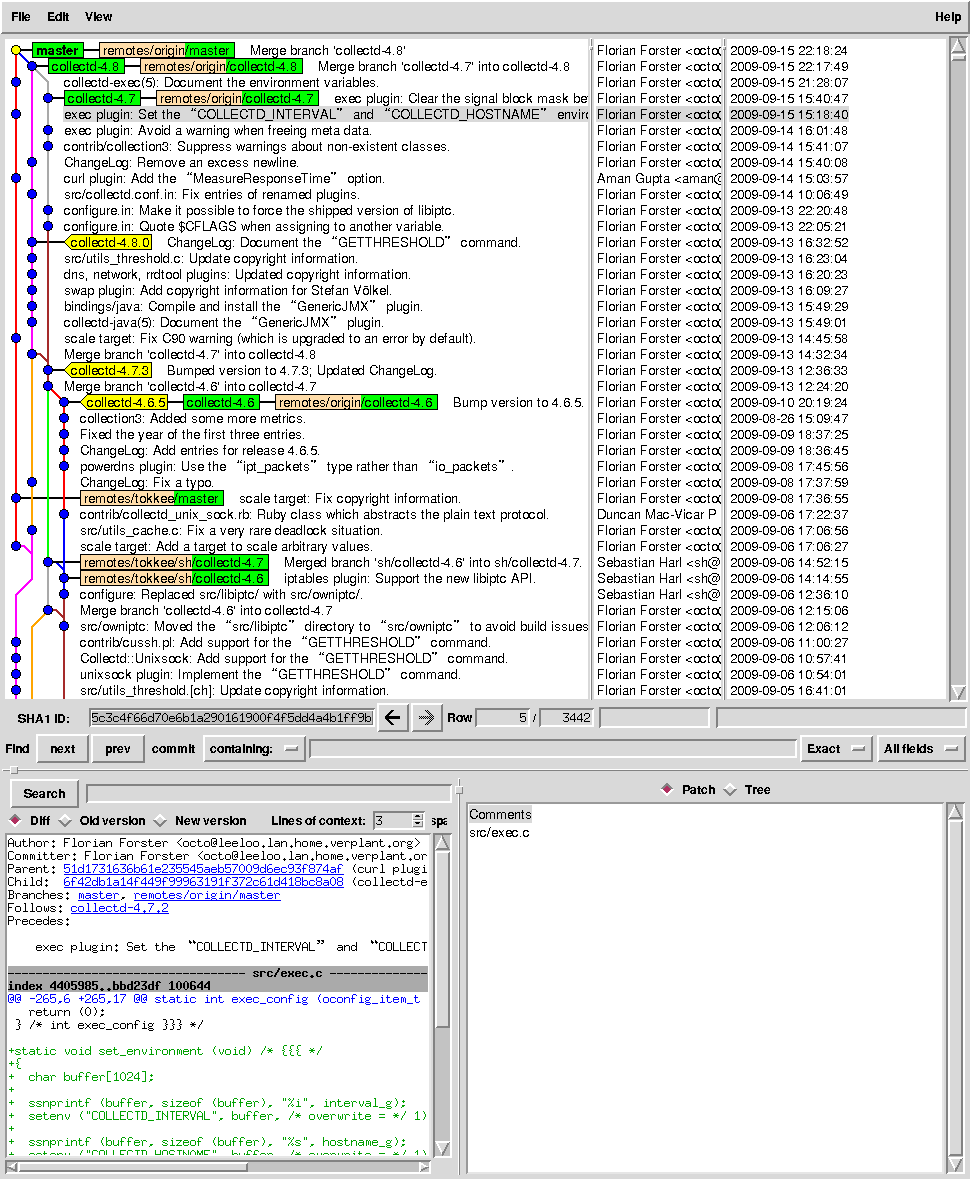Repository
The source code of collectd is organized in a Git repository.
The official repository is available from:
git://git.verplant.org/collectd.git
To clone the repository use:
$ git clone git://git.verplant.org/collectd.git
If you're more comfortable using Github you can use the mirror available there. Its web address is:
https://github.com/collectd/collectd
The public clone URL is:
git://github.com/collectd/collectd.git
If you sent a patch to the mailing-list, chances are you were told that
“… the changes are in the ‘foobar’ branch.”
Usually this happens when a patch is not yet ready to be applied to the master branch (see below) and needs some review. For example, the main developers did some changes and ask you to verify that they didn't accidentally break anything.
To check out this ‘foobar’ branch, you have to clone the repository first, using the git clone command (see above). After that is done, “cd” into the newly created collectd/ directory. There you have to create a local copy of the branch, using:
git branch --track foobar remotes/origin/foobar
Then you have to check out that branch:
git checkout foobar
For further documentation on Git, please refer to the Git homepage. There you'll find documentation for beginners, SVN converts, computer scientists (people comfortable with terms such as “directed acyclic graph”) and much more.
We maintain three branches: One development branch (named “master”) and two bugfix branches. The first bugfix branch corresponds to the latest release, the second bugfix branch corresponds to the second latest release. Those are the versions we provide bugfixes for. At the time of this writing (August 2010), those versions were “collectd-4.10” and “collectd-4.9”.
◆ ◄──────── master ⎫
│╲ ⎪
│ ╲ ⎪
│ ◆ ◄───── bugfix0 ⎬ branch heads
│ │╲ ⎪
│ │ ╲ ⎪
│ │ ◆ ◄── bugfix1 ⎭
│ │ │
│ │ │
◇◅─│──│──── bug not released yet / new feature
│ │ │ (available in “master” only)
│ │ │
│ ◇◅─│──── fix for bug introduced in the newest version
│ │ │ (available in “bugfix0” and “master”)
│ │ │
│ │ ◇◅─── fix for bug introduced in an earlier version
│ │ │ (available in “bugfix1”, “bugfix0” and “master”)
│ │ │

Bugfixes are applied to the earliest branch possible. If a bug existed for a while, this is probably the “bugfix1” branch. If the bug was introduced in the latest release (i. e. “collectd-4.9” currently), then the fix is applied to “bugfix0”. If the commit fixes a bug that has not yet been released or adds a new feature, it is committed to the “master” branch. From time to time, the “bugfix1” branch is merged into the “bugfix0” and the “bugfix0” branch is merged into “master”, so that bugfixes are included in all appropriate branches.
With the release of version-4.9 the “collectd-4.8” branch became the new “bugfix1” branch and the “collectd-4.7” branch is now obsolete. Release 4.7.5 was created so that the “collectd-4.7” version does not fall into oblivion with unreleased bugfixes still in the appropriate branch.
The following recommended configuration will automatically format .c, .h and .proto files when committing them to the repository.
# .git/config
[filter "clang-format"]
clean = /usr/bin/clang-format -style=LLVM
smudge = /usr/bin/clang-format -style=LLVM
# .gitattributes
*.c text filter=clang-format
*.cc text filter=clang-format
*.h text filter=clang-format
*.proto text filter=clang-format
In order to merge or rebase a pull request that is based on a non-normalized version of the repository, you can use the recursive merge strategy with the renormalize option to let Git reformat all participants in a three way merge, resolving the majority formatting based merge conflicts.
git merge -s recursive -X renormalize $branch
If you're using vim, you can configure it to run clang-format on each save:
# ~/.vimrc
set autoread
autocmd BufWritePost *.c !clang-format -style=LLVM -i <afile>
autocmd BufWritePost *.cc !clang-format -style=LLVM -i <afile>